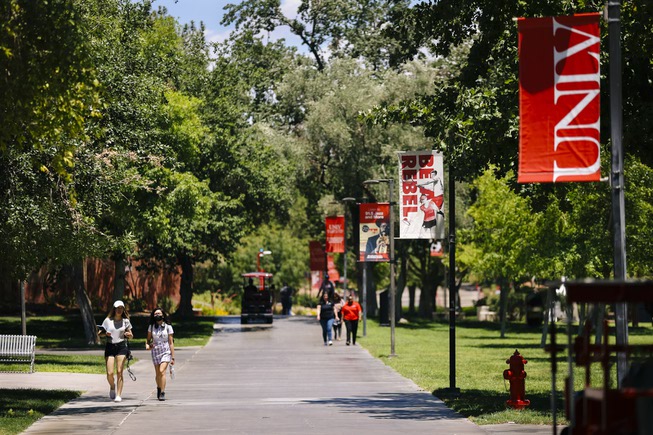Thursday, June 29, 2023 | 11:22 a.m.
A ruling today by the U.S. Supreme Court ending affirmative action, a decades-old norm intended to bolster the number of minority students accepted into universities, won’t change admission practice at UNLV, officials said.
That’s because they don’t consider race when evaluating a prospective student.
The high court ruled in two separate cases, one against Harvard University and the other against the University of North Carolina, that race cannot be a factor when considering a student for admission.
“The U.S. Supreme Court’s recent decision to eliminate race-based considerations in the college admissions process will not fundamentally impact UNLV’s open-access admissions policy or affect our mission of supporting a culture of equity and inclusion for our students, faculty and staff,” the unviersity said in a statement.
“UNLV is located in a richly diverse community and we’re proud to rank among the nation’s most diverse universities,” the statement said. “We’ll continue to review the court’s ruling to ensure all university policies are in compliance with any updates to federal law, and we remain committed to the ideals of inclusion, diversity, and equity so that every member of our Rebel family feels a strong sense of belonging.”
The majority conservative court ruled 6-2 against Harvard — with Justice Ketanji Brown Jackson, the court’s first Black female justice — recusing herself because she had been a member of a Harvard advisory governing board. It ruled 6-3 against UNC.
U.S. Rep. Steven Horsford, D-Nev, whose district includes much of downtown Las Vegas, North Las Vegas and some of the state’s most diverse communities, lambasted the rulings.
“For decades, affirmative action has opened the doors to segments of our population, from white women, to Black, Latino, Asian and Tribal youth, who had persevered as barrier after barrier came in their path, including many Nevadans,” Horsford, chair of the Congressional Black Caucus, said in a statement.
“Inherently, the court is saying those who are wealthy, those who have family that have gone to these institutions, those with the privilege to attend elite prep schools, can have an advantage in getting a higher education, while those who have succeeded despite centuries and decades of institutional abuse and racism, from slavery to internment camps to forced deportations of American citizens, will struggle to compete with the wealthy and elite,” Horsford said.
In a dissent, Jackson wrote, “With let-them-eat-cake obliviousness, today, the majority pulls the ripcord and announces ‘colorblindness for all’ by legal fiat. But deeming race irrelevant in law does not make it so in life.”
Nevada Attorney General Aaron Ford agreed with Jackson.
“Today's ruling directly attacks efforts to reckon with America’s history of racism and the ways it still impacts our lives today,” Ford said in a statement. “The ruling purports that colorblindness will end racism, but as Judge Jackson writes in her dissent, proceeding in forced ignorance of racial disparities simply allows those disparities to thrive in America.”
“Institutions of power like the Supreme Court should be working to reduce these disparities, to create a national environment that helps all Americans thrive and succeed,” Ford said. “When an institution that purportedly works for the people directly attacks efforts to create a better nation, it has failed in the role it was given.”
“I am tired, like many of you, with the disappointments that the Supreme Court continues to hand down to Americans under the guise of textual impartiality,” Ford said. “Let me promise you this — my disappointment means I will fight harder. We must not let setbacks push us into apathy. Turn your frustration and your anger into a drive to continue fighting to make America a better place for all who live here and call our country home.”
U.S. Rep. Dina Titus, D-Nev., whose district envelops UNLV and the Strip, voiced similar sentiments.
“As a former UNLV professor, I know that we should be breaking down barriers to accessing higher education, not creating more,” Titus said in a statement. “This ruling does not resolve our country’s gaps in achievement; it turns a blind eye to them and will hinder ongoing efforts to address systemic racial inequalities in academia.”

